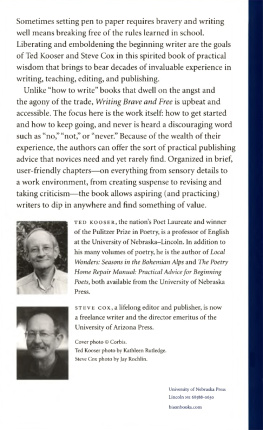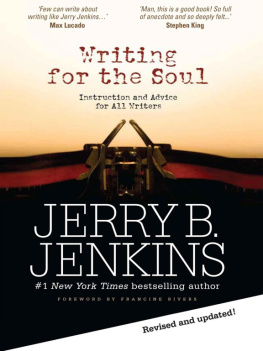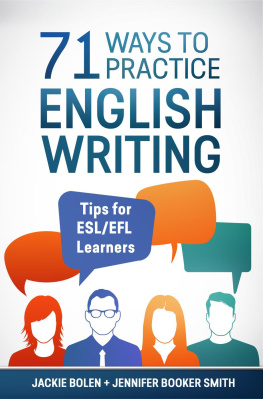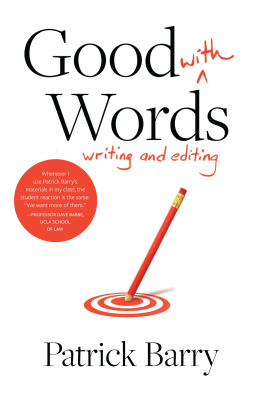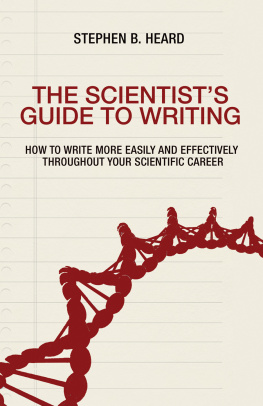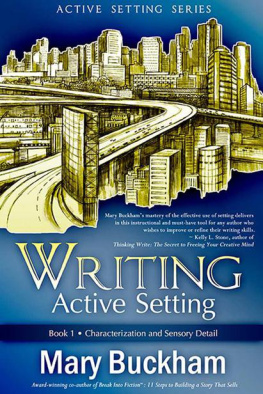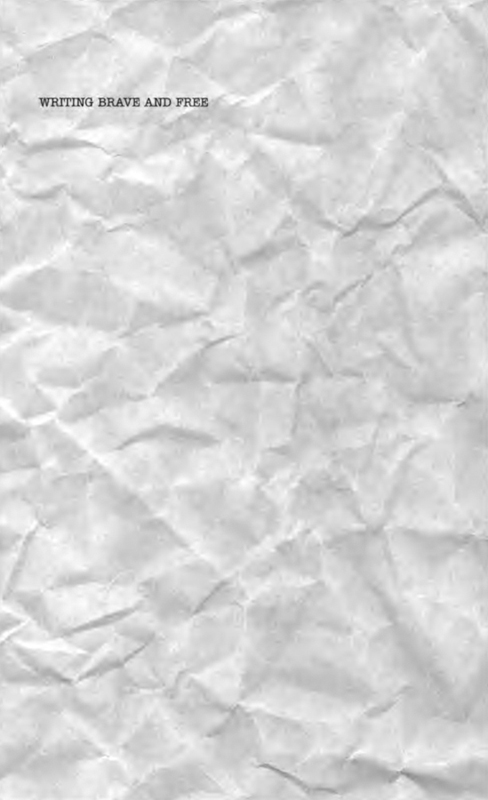

This book is a work of fiction.
Names, characters, places, and incidents either are productsof the authors imagination or are used in a fictional setting. Any resemblance to actual events or locales or persons, living or dead, is entirely coincidental.
Vision by Sweetwater
from Selected Poems , 3rd ed.,
revised and enlarged
by John Crowe Ransom,
1924, 1927 by
Alfred A. Knopf, Inc., and
renewed 1952, 1955
by John Crowe Ransom.
Used by permission
of Alfred A. Knopf,
a division of Random House, Inc.
The Vacuum from The Collected
Poems of Howard Nemerov (Chicago:
University of Chicago Press, 1977).
2006 by the Board of Regents
of the University of Nebraska
All rights reserved
Library of Congress Cataloging
in-Publication Data
Kooser, Ted.
Writing brave and free: encouraging
words for people who want to start
writing / Ted Kooser and Steve Cox.
p. cm.
Includes bibliographical references.
ISBN-13:978-0-8032-2780-4 (cl;: alk. paper)
ISBN-10:0-8032-2780-9 (cl.: alk. paper)
ISBN-13:978-0-8032-7832-5 (pbk.: alk. paper)
ISBN-10: 0-8032-7832-2 (pbk.: alk. paper)
ISBN-13: 978-0-8032-7696-3 (electronic: e-pub)
ISBN-13: 978-0-8032-7697-0 (electronic: mobi)
1. Authorship. I. Cox, Steve, 1939II. Title.
PN147.K69 2006 808.02-dc22 2005020673
The publisher does not have any control over and does not assume any responsibility for author or third-party websites or their content.


Writing Brave and Free
Carl Sandburg wrote poems all his life. When he was eighty-five years old, he published a book entitled Honey and Salt (1963) and in it is a long, free, funny poem about love.
In that poem, Little Word, Little White Bird, Sandburg compares love with all sorts of lively things. Is love a cat, he asks, with claws and wild mate screams in the black night? Is love a free glad spender, ready to spend to the limit, and then go head over heels in debt? Or maybe, he says, love is an elephant, and you step out of the way where the elephant comes trampling, tromping, traveling with big feet immense and slow and easy.
Page after page, Sandburg slings ideas, comparisons, and images every which way, like a man digging through a box of favorite tools and pulling out this and that, pleased to show us what hes found. Never does he seem to doubt himself.
To write that exultant poem about love at eighty-five, Sandburg must have learned a way to start fresh all over again, every morning. He must have developed great confidence in his ability to write, and to write wild and free. Confidence is one of a writers most valuable tools, and though it can sometimes be hard to find at the hardware store, we know where you can find it. We intend to show you that tool. Its right there inside you, believe it or not, hanging on a nail under the stairs, ready to be taken down and dusted off.
But first, a little about the writers other tools.
Like Sandburg, every writer has a tool kit. Every writer needs tools you can touch and feela desk and a lamp, a computer or pen and paperand tools you cant quite touch but can hold in your headthe ways to use nouns, verbs, ideas, metaphors, rhythms, attitudes, feelings, questions, memories of people and places, and the ways of organizing thoughts.
Most of the tools writers need they gather through experience. Singers learn by listening to lots of music, and then by practicing and by singing in public. Writers build a writing tool kit by reading hungrily, by borrowing tools from other writers, by making a little time to write every day, and then by showing what theyve written to someone else and carefully listening to what they have to say.
That business of reading hungrily and borrowing tools from other writers needs a little emphasis. Every writer learns by imitation, and the more you read, the more you find to imitate, to model your own work upon. If you want to start writing, part of the discipline is to read as much as you can. And youll find that you learn almost as much from reading bad writing as from good. Each and every exposure to the written word will help you as a writer.
By the time he was eighty-five, Carl Sandburgs basic tool kit probably could have filled a freight car. Yet the most important things he pulled out of his kit every morning were his confidence, his joy in the work, and the heart to write wild and free.
The authors of this book are not yet eighty-five. But were old enough to be retired from our day jobs (perhaps you are, too), and each of us has accumulated a garage full of writing tools.
Nobody else has had exactly the experiences you will be writing about. And nobody else has drawn on exactly our experience in writing a book about writing.
Ted has been writing and publishing for more than forty years. He has read his poems and essays to audiences in galleries, libraries, and sitting on the ground in a native prairie, and he has listened to writers read their own work in those same places. He has talked with and corresponded with other writers about their words and his own. He has led writers groups and taught university seminars. Steve has written poems and essays and spent his working life as a book editor. Both of us have watched writers get started, and mature, and weve cheered them on as they have succeeded. Weve both thought a lot about how to start writing, how to keep going, and what makes writing effective.
Weve written this book for people who want to write and are looking for a way to get startedpeople who, halfway through a full life, want to set down what they know, people who may have some potential readers in mind, whether relatives, like-minded people, or complete strangers. We want to help people who have been saying for ten, twenty, or thirty years that theyd like to start writing, but who havent started. Starting to write takes courage, of course, and maybe youve never been able to find that courage. We intend to help you find it.
We want to show you a few other toolsto tell you a few of the things we know, think, and feel about writing. Rather than offering a schoolbook that proceeds in a straight line from A to Z, covering all the bases, with quizzes at the ends of chapters, we decided to give you a short book resting on our own experience. We throw in a few surprises, some of them in unexpected places. You can skip around and open our book at any page and, we hope, get some good out of it.
We want to help you write because we believe there can never be too many writers. Why not a world in which everybody is writing? Surely writing, and the contemplative life that goes with it, is a much better way to spend your time than a hundred time-filling activities we could name. Besides, nothing is so exhilarating as to work at something you enjoy, and thats an experience that writing can give you.
Your own experiencethe world as you live in itis unique. It is a matchless, deep pleasure to write with love of your experience, to relive your life while you write it down, and to learn from your own experience as it unfolds on the page.
Your experience is unique, and so is that of every human being. That is one reason we want everyone to enjoy the privilege of writing.
Next page
